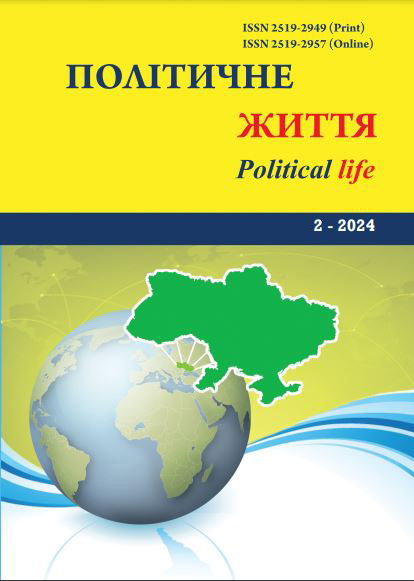Contextualization of National Narratives in the Memorial Industry on the Example of Mnemohistorical Analysis in the Longitudinal Study of Tina van der Vlies
DOI:
https://doi.org/10.31558/2519-2949.2024.2.18Keywords:
memorial policy, memory, national identity, political process, mnemonic analysis, political conjuncture, narrativesAbstract
The memorial industry, which includes the creation, maintenance and promotion of cultural and educational initiatives, plays an important role in preserving and shaping individual and collective memories. National narratives, as key elements of the memorial industry, reflect the cultural and historical perceptions, ideals, and values of a society, influencing the formation of a collective identity. However, the memorial industry can be a field of political and ideological struggle, where different groups try to promote their own interpretations of history. History textbooks, as an important tool for shaping national narratives, often perpetuate traditional historical narratives while ignoring new findings and ideas, contributing to structural amnesia. Research in this area, such as the works of F. Ankersmith, A. Assman, J. Assman, and others, develops mnemonic analysis aimed at analyzing the ways in which historical events are reflected and interpreted in public memory. The aim of the paper is to determine the impact of the political context – contextualization – on the dynamics of the memorial industry and the stability of basic national narratives through the analysis of a longitudinal study by Tina van der Vlies, which makes a significant contribution to understanding the impact of the political context on the dynamics of the memorial industry and the stability of basic national narratives through a longitudinal analysis of history textbooks in the UK and the Netherlands. The article concludes that while some elements of the narratives remain unchanged, the choice of topics and emphasis in textbooks evolves, reflecting the influence of the socio-political context without direct political intervention.This indicates the dynamism of narratives, where events and characters can fade into the background or become relevant again, depending on their relevance to the present.The study demonstrates the importance of historicizing and engaging a variety of sources, including new media, for a deeper understanding of narrative changes and ruptures.
References
Assmann J. (1997). Moses the Egyptian: The Memory of Egypt in Western Monotheism. Cambridge, MA: Harvard University Press, P. 9–10.
Assmann J., Czaplicka J. (1995). Collective Memory and Cultural Identity. New German Critique. Vol. 65. P. 125–133.
Beauvallet А. (2015). Thatcherism and Education in England : A One-way Street ? OpenEdition Journals. 2015. No17. p. 97-114.
Bentrovato D. (2016). Whose Past, What Future?Teaching Contested Histories in Contemporary Rwanda and Burundi. History can Bite. History Education in Divided and Postwar Societies. Red. Susanne Grindel, Roderich Henrÿ und Ralf Kasper. Göttingen: V&R unipress GmbH, 2016. P. 221-243.
Commissaris, A.J.C. (1931). Geschiedenis van de emancipatie der katholieken in Nederland van 1795-1903. Groningen, 324 р.
David Cameron’s speech on the UK’s strength and security in the EU on May 9, 2016, www.gov.uk/government/speeches/pm-speech-on-the-uks-strength-and-security-in-theeu-9-may-2016 (Last accessed: 20.03.2024)
Dyck K.(2016). Confronting Genocide Denial in US History Textbooks. History can Bite. History Education in Divided and Postwar Societies. Red. Susanne Grindel, Roderich Henrÿ und Ralf Kasper. Göttingen: V&R unipress GmbH, P. 177-191.
Foulds K. (2016). The Somali Question: Protracted Conflict, NationalNarratives, and Curricular Politicsin Keny. History can Bite. History Education in Divided and Postwar Societies. Red. Susanne Grindel, Roderich Henrÿ und Ralf Kasper. Göttingen: V&R unipress GmbH, 2016.. P. 45-61.
Gellman M. (2016). Only Looking Forward: The Absence of War History in Sierra. History can Bite. History Education in Divided and Postwar Societies. Red. Susanne Grindel, Roderich Henrÿ und Ralf Kasper. Göttingen: V&R unipress GmbH, P. 141-157.
Lerch J. (2016). Embracing Diversity?Textbook Narratives in Countries with aLegacy of Internal Armed Conflict, 1950 to 2011. History can Bite. History Education in Divided and Postwar Societies. Red. Susanne Grindel, Roderich Henrÿ und Ralf Kasper. Göttingen: V&R unipress GmbH, P. 31-45.
Maric´D. (2016). The Homeland War in Croatian History Education:Between “Real Truth” and Innovative History Teaching. History can Bite. History Education in Divided and Postwar Societies. Red. Susanne Grindel, Roderich Henrÿ und Ralf Kasper. Göttingen: V&R unipress GmbH, P. 85-111.
Mattingly G. (1959). The Armada. Boston: Riverside Press Cambridge/Houghton Mifflin Company, 402 p.
Michelle J. (2016). Bellino Learning through Silence in “Postwar” Guatemala. History can Bite. History Education in Divided and Postwar Societies. Red. Susanne Grindel, Roderich Henrÿ und Ralf Kasper. Göttingen: V&R unipress GmbH, P. 177-191.
O’Toole F. ‘Brexit is being driven by English nationalism. And it will end in self-rule’, The Guardian, June 19, 2016. This column was awarded with the European Press Prize Commentator Award in 2017, https://www.theguardian.com/commentisfree/2016/jun/18/ england-eu-referendum-brexit (Last accessed: 20.03.2024)
Savard M. (2016). Using Education as aPolitical Tool to Advance Marginalization in Northern Uganda. History can Bite. History Education in Divided and Postwar Societies. Red. Susanne Grindel, Roderich Henrÿ und Ralf Kasper. Göttingen: V&R unipress GmbH, P. 157-177.
Sefa-Nyarko C. (2016). Competing Narratives of Post-independence Violence in Ghanaian Social Studies Textbooks, 1987 to 2010. History can Bite. History Education in Divided and Postwar Societies. Red. Susanne Grindel, Roderich Henrÿ und Ralf Kasper. Göttingen: V&R unipress GmbH, P.61-85.
Todorov P. (2016). Teaching History in Macedonia after 2001: Representations of Armed Conflict between Ethnic Macedonians and Ethnic Albanians. History can Bite. History Education in Divided and Postwar Societies. Red. Susanne Grindel, Roderich Henrÿ und Ralf Kasper. Göttingen: V&R unipress GmbH, P. 111-125.
Tripathi D. (2016). Sustainable Peace Between India and Pakistan: ACase for Restructuring the School Education System. History can Bite. History Education in Divided and Postwar Societies. Red. Susanne Grindel, Roderich Henrÿ und Ralf Kasper. Göttingen: V&R unipress GmbH, P. 125-141.
Van der Vlies T. (2022). Echoing Events The Perpetuation of National Narratives in English and Dutch History Textbooks, 1920–2010. Bildungsmedienforschung. Studien des Leibniz-Instituts für Bildungsmedien. Band 152. Herausgegeben von Eckhardt Fuchs. Göttingen : Brill; Runipress, 359 p.

